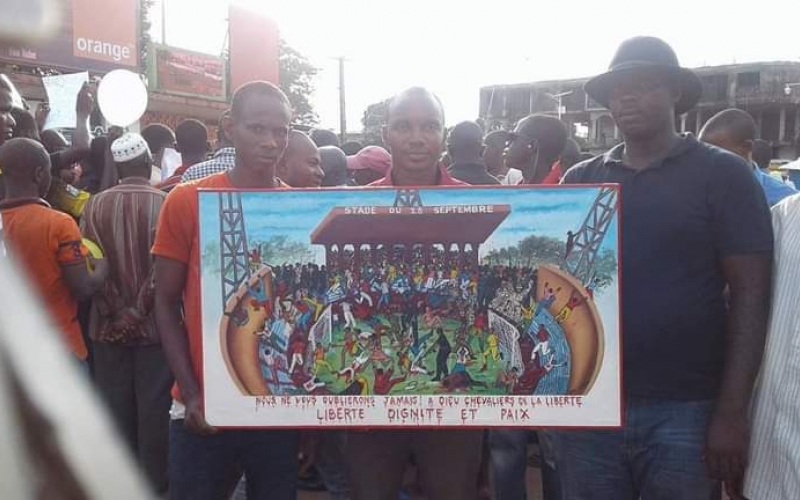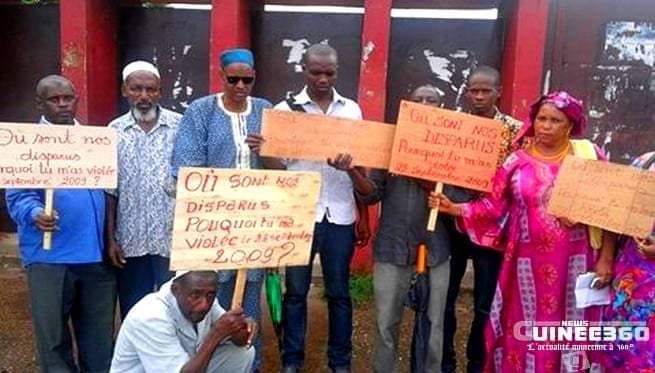Guinea, towards the organization of the trial of the massacres of 28 September 2009

By the Guinean National Coalition for the International Criminal Court
Thirteen years later, Guinea is moving towards the organization of the trial of the crimes committed on civilians on September 28, 2009 in Conakry stadium, during a peaceful rally of the opposition forces against the possible candidacy of Captain Moussa Dadis Camara, leader of the junta and president of the National Council for Democracy and Development (Conseil National pour la Démocratie et le Développement) in the 2010 presidential election.
According to a report from the United Nations Commission of Inquiry, the crimes committed on September 28, 2009 and the following days amount to crimes against humanity on the basis of the deaths of 157 civilians, 89 missing persons, 109 victims of sexual violence, thousands more injured, in addition to hundreds of detainees tortured in military camps, as well as the looting of private property.
Guinea is no stranger to the state violence that has characterized the different successive regimes in power since its independence on October 2, 1958, nor to total impunity for human rights violations. But it was the crimes of 28 September 2009, which qualified as crimes against impunity, that placed the country in a situation of preliminary examination by the Office of the Prosecutor of the International Criminal Court (ICC).
On February 8, 2010, Guinean authorities opened an investigation to establish responsibilities for the crimes committed on September 28, 2009, through the establishment of a pool of investigating judges, composed of three magistrates.
After all investigations and legal remedies exercised by the various parties before the courts and tribunals, thirteen military and civilian defendants were sent to the criminal court of Dixinn to be tried.

It must be recognized that if Guinean justice has worked, with complete independence, to ensure that the crimes of September 28, 2009 do not go unpunished, the International Criminal Court through its Office of the Prosecutor has played a leading role in pushing the Guinean State to honor its commitments under the Rome Statute of July 17, 1998.
It should also be recalled that about twenty missions were carried out by the Office of the Prosecutor of the International Criminal Court in Guinea so that the trial of the Conakry stadium massacres be held within the framework of the principle of complementarity.
The Guinean Coalition for the International Criminal Court welcomed the scheduling of the trial on the stadium events on September 28, 2022, by the Minister of Justice and Human Rights, Alphone Charles Wright, during an official meeting between his department and the legal representatives of the victims on Friday, September 16, 2022.
This decision brings joy to the victims of the Conakry stadium massacres, who nevertheless asked Minister Alphonse Charles Wright to ensure their safety.
The trial of the Conakry stadium massacres will allow the victims to identify the perpetrators and accomplices of the events on September 28, 2009 and why the defense and security forces who were supposed to protect the population fired, at close range, on civilians in a closed stadium.
The answers to these questions will allow the victims to grieve so that the lost souls can finally rest in peace and so that this will never happen again in the Republic of Guinea.
Such a trial will not only make it possible to fight against impunity in Guinea, but also to restore the image of Guinean justice.
Finally, the success of such a trial will serve as an example of complementarity, as provided for by the Rome Statute of July 17, 1998, and the efforts made by the Office of the Prosecutor of the International Criminal Court during the last thirteen years will not be in vain.
It is also through justice that reconciliation will be achieved, because as Desmond Tutu said, there is no future without forgiveness and there is no forgiveness without justice.
